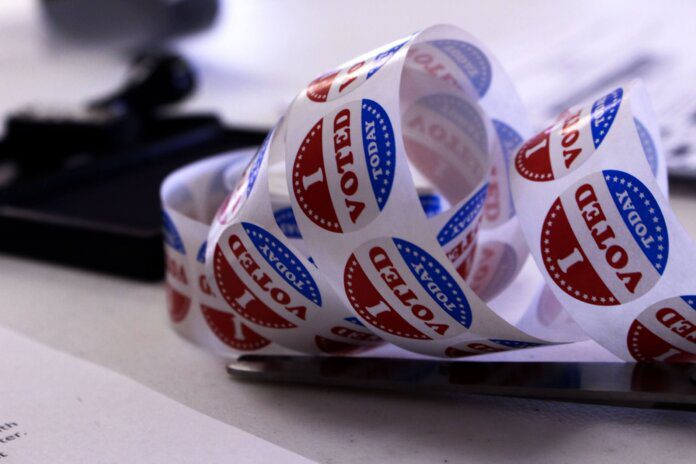Republicans Offer Slate of Election Bills
They won’t suppress votes, Bernier and other GOP legislators promise. Democrats skeptical.
On Monday, Republicans began circulating a package of draft election bills based on recommendations in a report released last year by the Legislative Audit Bureau (LAB). Yet Democrats are skeptical of the measures, saying Republicans have made too many bad faith attacks on the state’s elections in the past to be taken seriously.
Leading the introduction of the bills is Sen. Kathy Bernier (R-Chippewa Falls), who is one of the few Wisconsin Republicans who has stood up for the state’s election administrators and defended the results of the 2020 presidential election from the conspiracy theories of former President Donald Trump and her fellow legislators.
“After every election, we figure out what didn’t work as planned and we fix it. These bills will fix the problems that have led to unprecedented questions about the last presidential election,” Bernier said. “Anyone who opposes these bills falls into two camps; there is no other characterization: either they wish to impugn the integrity of our highly respected non-partisan audit bureau, or they wish to undermine faith in democracy by lying to the public about election administration for their own personal gain. I will not stand for either.”
Last year, the nonpartisan LAB completed an investigation and released a report about the 2020 election. The report affirmed, just like numerous lawsuits, recounts and investigations had previously, that Joe Biden won Wisconsin and there was no widespread evidence of fraud.
The report did provide a number of recommendations for legislators and the Wisconsin Elections Commission (WEC) for election administration and to clear up issues that Republicans have focused on as sources of fraud and possible misconduct.
The WEC has already begun the process of implementing the LAB’s recommendations — even though the commission’s staff and members have criticized the report’s accuracy.
Michael Luckey, Bernier’s chief of staff, says the goal of the bills is to address the LAB recommendations and address some of the specific problems that were created by the pandemic.
“These provisions are taken from the nonpartisan LAB report, in a lot of cases word for word,” Luckey says. “These bills went through 10 revisions in some cases, working with the elections commission, with the disabilities communities, and the legislative council. We tried to stick faithfully to issues that were raised by the nonpartisan audit bureau. There are lingering questions about what happened in 2020 — whether or not those questions should exist. So by taking advice from this report we’re hoping these bills are seen as what they’re meant to be, which is an honest attempt at improving the problems that arose because of the pandemic.”
Along with Bernier, Sens. Robert Cowles (R-Green Bay), Alberta Darling (R-River Hills) and Duey Stroebel (R-Saukville) and Reps. Barb Dittrich (R-Oconomowoc), Cindi Duchow (R-Town of Delafield) and John Macco (R-Ledgeview) have all signed on to the bills.
The draft bills include measures that would change how municipalities prepare for elections, how voting itself is administered and what happens after an election is completed. Several address some of the most controversial issues surrounding Wisconsin’s election laws.
One measure would prohibit municipalities from accepting private donations to assist with election administration. In 2020, a group affiliated with Facebook CEO Mark Zuckerberg and his wife gave grants to municipalities across the state to help with running the election. Republicans have repeatedly highlighted the grants received by some of Wisconsin’s biggest, and most Democratic, cities as a source of potential fraud.
Another measure addresses how residents of nursing homes or similar care facilities are able to return absentee ballots. Normally, Wisconsin has trained and certified election workers known as special voting deputies (SVDs) visit these facilities and assist with the completion of ballots. In 2020, to protect residents against infection, nursing homes weren’t allowing visitors and the WEC voted to forgo the normal process that requires the SVDs to attempt two visits to the facility.
This decision has led to accusations of fraud from Republicans, and Racine County Sheriff Christopher Schmaling has called for felony charges against five of the six elections commissioners, alleging that some nursing home employees helped residents vote without the legal authority to do so.
The proposed bill would provide for an alternative method if SVDs aren’t able to visit the facilities due to a public health emergency. Employees of the facilities will be able to complete a two-hour online training and become certified as personal care voting assistants to help residents complete ballots.
These employees will not be able to register residents to vote.
When a person completes an absentee ballot a witness and the voter must sign the envelope and provide their addresses. For years, municipal clerks have been able to fill in some missing information if the voter or witness forgot to include details such as a municipality or zip code — or even the whole address if the clerk knows where the person lives.
The WEC is currently in the process of making this practice, which has existed as unofficial guidance, a permanent administrative rule. The proposed bill would outlaw this practice but also require that the envelopes clearly name what information is required.
Frequently voters and witnesses forget a zip code or the state, which won’t be required anymore so the clerk won’t need to add that information, according to Luckey.
“In the bill, it would consider the envelope complete even if it did not have state or zip code,” he says. “In order to avoid that confusion they need to be delineated clearly. So that people know what is required.”
One of the bills addresses Wisconsin’s indefinitely confined voter status, which allows people who are unable to go to the polls in person because of age, physical illness, infirmity or disability to automatically receive an absentee ballot for each election.
In the weeks before the April 2020 election, elections officials in Madison and Milwaukee encouraged voters to claim indefinitely confined status because of the pandemic. The clerks stopped giving this advice after an order of the Wisconsin Supreme Court.
The proposed bill clarifies who qualifies for indefinitely confined status, explicitly stating that the presence of a communicable disease does not make someone eligible, and changes how people can apply for the status. The bill also orders the WEC to remove the indefinitely confined status for any voter who received it between March 12 and Nov. 6, 2020.
Another provision in the bills would require local election officials to complete a report whenever wait times at polling places are longer than one hour. In the April 2020 election, wait times across the state — but especially in larger cities such as Green Bay and Milwaukee — ballooned after elections officials were forced to close polling places due to a lack of poll workers because of the pandemic.
The bill requires that in places where there is at least one incidence of a wait longer than an hour, elections officials must take steps to reduce waits in future elections — though the bill doesn’t include any appropriations or resources to help municipalities achieve this.
“I think what we want to do is wait and see how it plays out in this first round,” Luckey says.
The Republican bills were released after more than a year and a half of Republican antagonism against the 2020 election and decades of voter suppression efforts targeting frequent Democratic voters, especially people of color.
A partisan review of the 2020 election by former Supreme Court Justice Michael Gableman, under the direction of Assembly Speaker Robin Vos, has continuously cast doubt on the 2020 election results and continued the spread of conspiracy theories that the election was stolen.
Under former Republican Gov. Scott Walker, Republicans instituted one of the harshest voter ID laws and created one of the most extreme partisan gerrymanders in the country.
Sen. Kelda Roys (D-Madison), who sits on the Senate Committee on Elections, Election Process Reform and Ethics, says it’s hard to ignore that history when considering Republican election proposals — even if there are some good ideas in the package.
“I’m going to look at every specific piece of legislation as I always do and make a determination,” she continues. “The hurdle is very, very high because I’m not going to support anything that undermines confidence in our elections or makes it harder for people to access the ballot box. It’s not that there couldn’t be a good idea in there, but oftentimes one good idea is wrapped in five bad ones. What’s the net effect of the bill going to be?”
Sen. Jeff Smith (D-Brunswick), who also sits on the Senate elections committee, echoes Roys, saying for too long Republicans have acted with ill intentions when it comes to changing election rules.
“It’s hard to believe these partisan bills are a good-faith effort on the part of Republicans to improve our election process after they spent the last year peddling the Big Lie,” Smith says. “Even today, Republicans are introducing bills that give their party blatant control over our elections. Despite these concerns, I am practicing proper due diligence, communicating with local clerks and state auditors to understand the impact these bills could have on Wisconsinites’ ability to safely and legally cast their ballot.”
The deadline for co-sponsorship on the Republican bills is Wednesday.
Republicans introduce slate of elections bills, but Democrats are skeptical was originally published by the Wisconsin Examiner.























I imagine that the poll wait time part is for Republicans to find polls in democratic areas that are not stranding voters, so they can try to change it so votes are lot for Democrats.
Republicans are totalitarian, they should never be trusted.
It should be noted that not only are Republicans offering a slate of election Bills, they also recently offered their own SLATE of ELECTORS! (Who may soon be the subjects of prosecution). The “Party Of Lincoln”?